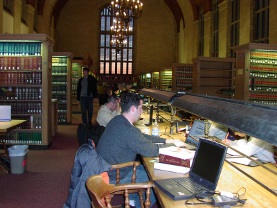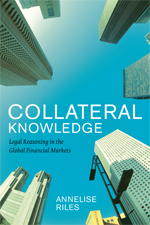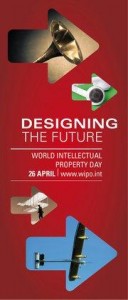 In February, the Law Library conducted a Student Library Satisfaction Survey. More than 160 students responded to the survey for which we are most grateful. Respondents included JD students from all three classes, LLMs, and JSDs. A significant number of students indicated that they are currently active with journals, moot court, clinics, or as research assistants. Four out of five respondents visit the library, not including walking through, from a few times a week to daily. Not surprisingly, 90% said they visit the library to study. Other common reasons to visit the library include using the Internet and printers, copying and scanning, checking out books, and researching for assignments.
In February, the Law Library conducted a Student Library Satisfaction Survey. More than 160 students responded to the survey for which we are most grateful. Respondents included JD students from all three classes, LLMs, and JSDs. A significant number of students indicated that they are currently active with journals, moot court, clinics, or as research assistants. Four out of five respondents visit the library, not including walking through, from a few times a week to daily. Not surprisingly, 90% said they visit the library to study. Other common reasons to visit the library include using the Internet and printers, copying and scanning, checking out books, and researching for assignments.
The survey gleaned both quantitative and qualitative information on the use of, and satisfaction with, Law Library facilities, web presence, and core services. We’ll address each of these on the Competitive Edge blog. Today’s post looks at library facilities.
To gauge student satisfaction with the library facilities, we asked respondents to rate the floor/space they use most often on five criteria: noise level, lighting, study space, group study room availability, and temperature. Students rated primarily the Reading Room, the second-floor, and the new ground floor. The mean numerical ratings of noise, lighting, study space, and temperature balanced at the “neutral” rating, but leaned toward satisfaction. On group study space availability, ratings leaned toward dissatisfaction. This is an ongoing issue in the Law Library, of which we are keenly aware. This is an item that we will address to the architects who are planning the law school renovation.
Temperature is also an issue, as reflected in the many comments we received. Typical of these: “It’s too cold in the Reading Room,” and the very expressive, “COLD! The reading room is freezing.” We are also aware of the cold temperatures in the Reading Room and on other floors. The Reading Room in particular, with its high ceiling and tall windows, is very difficult to heat. However, we have informed the facilities staff that students have expressed dissatisfaction with the cold.
While both the cold and lack of group study rooms are ongoing issues, there were many positive statements on the physical plant, too. Representative comments include: “The Reading Room is beautiful” and “It is a great place to study and be productive.”
The survey also inquired about equipment in the Law Library, including copiers/scanners, public computers, office supplies, and wireless Internet connection. Students are quite satisfied with the wireless connection, and generally satisfied with copiers/scanners, public computers, and office supplies.
The survey did elicit numerous comments on equipment and supplies in the Computer Lab, which is administratively separate from the Library and is under the purview of Law IT. Comments noted that computer mice and keyboards are often missing, printers often do not work, and that staplers and other supplies are either damaged or missing. We have discussed these matters with Law IT. IT regularly replaces missing or damaged items and that the printers are regularly maintained (and replaced) through a contract with the Computing Center. It is to the benefit of all students to use the equipment with care and to replace any item you may have borrowed. As the Lab cannot be staffed 24/7, students can help by keeping an eye out for problems and reporting them to the Lab managers as soon as possible.
If you have other feedback regarding the Law Library facilities, do let us know. Our next post on the survey will cover the Library’s Web site.







